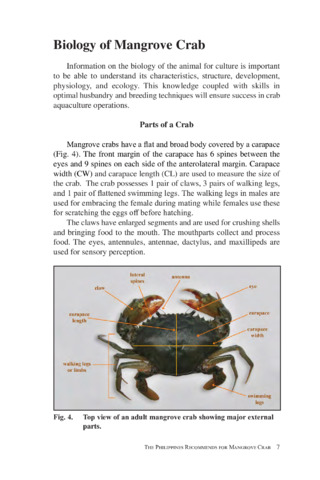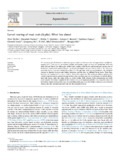Perlihatkan publikasi sederhana
Use of rotifers-fed microalgal paste in the seed production of mangrove crab Scylla serrata in the Philippines
| dc.contributor.author | Huervana, Joana Joy | |
| dc.contributor.author | Dionela, Cleresa S. | |
| dc.contributor.author | Villa-Franco, Annie | |
| dc.coverage.spatial | Philippines | en |
| dc.date.accessioned | 2022-09-29T06:59:22Z | |
| dc.date.available | 2022-09-29T06:59:22Z | |
| dc.date.issued | 2022-09-09 | |
| dc.identifier.citation | De La Cruz-Huervana, J. J., Dionela, C., & Franco, A. (2022). Use of rotifers-fed microalgal paste in the seed production of mangrove crab Scylla serrata in the Philippines. Journal of Applied Phycology, 34(6), 3047–3057. https://doi.org/10.1007/s10811-022-02841-9 | en |
| dc.identifier.issn | 0921-8971 | |
| dc.identifier.uri | http://hdl.handle.net/10862/6390 | |
| dc.description.abstract | Despite the progress in the production of artificial diets for marine larvae, feeding during the early life stages of most aquaculture species still relies on live feeds such as rotifers. Advanced rotifer culture techniques are also available, however, in the Philippines, majority use batch cultures with fresh microalgae. These microalgae are prone to collapse resulting to inadequate supply of food for the rotifers that are fed to the larvae. Mangrove crab is one of the economically important aquaculture species in the country where mass seed production requires sufficient and steady supply of rotifers. Thus, here we examined the possibility of substituting fresh culture of green microalgae Tetraselmis tetrathele (FA) with flocculated T. tetrathele paste (FP) and commercially available Tetraselmis sp. (CP) as feed for rotifers (Brachionus rotundiformis) in the seed production of mangrove crab. Rearing of larvae was done until crab instar 1 (DOC 24) where growth and survival were taken to evaluate the viability of rotifers-fed microalgal paste. It was observed that the growth index (FA–6.93 ± 0.07; FP–6.91 ± 0.07; CP–6.96 ± 0.05) was similar for all treatments (P > 0.05) at termination. Comparable survival rates were noted for FA and FP at 1.08 ± 0.59% and 3.21 ± 2.09%, respectively (P > 0.05) while a significantly higher survival (P < 0.05) was recorded for CP at 7.73 ± 1.90%. These findings suggest that the algal paste tested are potential alternatives to fresh microalgae and this technique could benefit hatchery operators who lack the capital for setting up the facility and technical skills to maintain microalgae production. | en |
| dc.description.sponsorship | This research project was carried out with the support of SEAFDEC/AQD (study code NR-02-C2018T). The authors greatly appreciate the assistance of Phycology laboratory and Crab hatchery staff in the production of algae and rotifers, and in the larval rearing experiments, respectively. | en |
| dc.language.iso | en | en |
| dc.publisher | Springer | en |
| dc.subject | Scylla serrata | en |
| dc.subject | Brachionus rotundiformis | en |
| dc.subject.lcsh | Microalgae | en |
| dc.title | Use of rotifers-fed microalgal paste in the seed production of mangrove crab Scylla serrata in the Philippines | en |
| dc.type | Article | en |
| dc.identifier.doi | 10.1007/s10811-022-02841-9 | |
| dc.citation.volume | 34 | |
| dc.citation.issue | 6 | |
| dc.citation.spage | 3047 | |
| dc.citation.epage | 3057 | |
| dc.citation.journalTitle | Journal of Applied Phycology | en |
| dc.subject.asfa | crab culture | en |
| dc.subject.asfa | seed production | en |
| dc.subject.asfa | breeding stock | en |
| dc.subject.asfa | water quality | en |
| dc.subject.asfa | survival | en |
| dc.subject.asfa | growth | en |
| dc.subject.asfa | fatty acids | en |
| dc.subject.asfa | feeds | en |
| dc.identifier.essn | 1573-5176 | |
| dc.subject.scientificName | Scylla serrata | en |
| dc.subject.scientificName | Tetraselmis tetrathele | en |
| dc.subject.scientificName | Brachionus rotundiformis | en |
| local.subject | Algal paste | en |
| local.subject | Crab | en |
| local.subject | Larval rearing | en |
| local.subject | Rotifers | en |
| local.subject | Scylla serrata | en |
Files in this item
| Files | Size | Format | View |
|---|---|---|---|
|
There are no files associated with this item. |
|||
Publikasi ini ada di koleksi berikut
-
Journal Articles [1262]
These papers were contributed by Department staff to various national and international journals.




